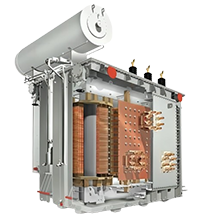
Principle:
An electric furnace transformer is a specialized transformer used for electric furnaces. Its working principle is similar to that of a standard transformer. The main function of the electric furnace transformer is to step down the high voltage from the main power supply to the low voltage required by the heating elements of the furnace. Electric furnace transformers typically have a high current capacity to meet the furnace’s high power demands and are equipped with an appropriate insulation system to ensure safe and reliable operation.
Advantages:
- High Efficiency: Electric furnace transformers are highly efficient, effectively converting high voltage to the required low voltage, thus reducing energy consumption.
- Precise Control: These transformers have precise voltage control capabilities, providing stable voltage output based on the heating requirements of the furnace.
- High Reliability: Professionally designed and manufactured, electric furnace transformers are highly reliable and durable, capable of long-term stable operation.
- Versatility: Electric furnace transformers are suitable for various types of furnaces, including induction furnaces, arc furnaces, and resistance furnaces, making them widely applicable.
- High Safety: Equipped with multiple safety protection devices, electric furnace transformers effectively prevent electrical faults such as overload and short circuits, ensuring the safety of both equipment and personnel.
Disadvantages:
- Large Size: Due to the need to handle high-power currents, electric furnace transformers are large in size, occupying considerable space.
- High Cost: The need for high power capacity and a complex insulation system makes the manufacturing cost of electric furnace transformers relatively high.
- Complex Maintenance: Maintaining electric furnace transformers requires specialized skills and equipment, leading to higher maintenance costs.
Applications:
- Metal Processing Industry: Electric furnace transformers are widely used in the metal processing industry, including steel mills, foundries, and metalworking workshops, powering equipment like resistance furnaces and arc furnaces.
- Chemical Industry: In the chemical industry, electric furnace transformers are often used for heating and processing chemical materials such as glass, ceramics, and metals.
- Construction Industry: In construction, these transformers can be used for heating concrete, plaster, and other building materials, as well as for heating floors and walls.
- Waste Management Industry: Electric furnace transformers are also commonly used in the waste management industry for incinerating waste, processing sludge, and treating wastewater.
In summary, electric furnace transformers play an important role in industrial production and processing, offering advantages such as high efficiency, precise control, and high reliability. They are suitable for a wide range of industrial and commercial applications.
